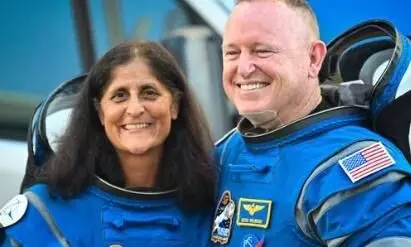
NASA launches Crew-9 mission to bring back astronauts from ISS
text_fieldsNew Delhi: Nasa launched its Crew-9 mission on Saturday to bring back astronauts Sunita Williams and Barry Wilmore who have been stranded on the International Space Station (ISS) since June 6, 2024 after spacecraft, Boeing's Starliner, faced complications.
The Crew-9 mission taking off from Cape Canaveral Space Force Station in Florida will bring to the space station Nasa’s astronaut Nick Hague and Russian cosmonaut Aleksandr Gorbunov.
Two seats out of the regular four in the spacecraft are reserved for Williams and Wilmore in their return journey. The Crew Dragon spacecraft will dock with the ISS on September 29.
After Starliner capsule suffered multiple helium leaks and thruster failures during docking, NASA plans faced setbacks, forcing the agency to extend Williams and Wilmore’s stay aboard ISS.
NASA decided to bring back Starliner uncrewed on September 6 finding after a thorough evaluation that the spacecraft was too risky for astronauts to travel.
Williams and Wilmore are likely to join Hague and Gorbunov for a five-month long science mission aboard the ISS after their return to Earth.
In the event of any emergency prior to Crew-9’s arrival, Williams and Wilmore can use the Crew-8 Dragon capsule docked at the ISS to return to Earth.
Meanwhile, Ken Bowersox, Nasa's Associate Administrator for Space Operations, expressed confidence in astronauts ability to adapt and thrive in space.





